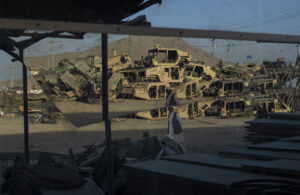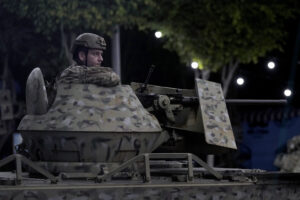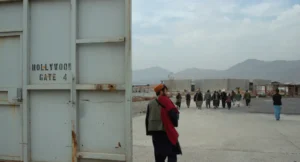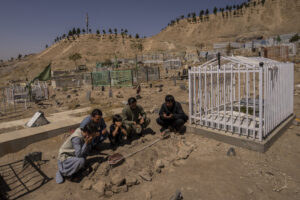Beyond Islamic State: The Folly of World War IV
Arguing that no alternative exists to open-ended war represents not hard-nosed realism, but the abdication of statecraft. The real problem is war itself and the conviction that only through war can America remain America. Jirka Matousek / CC BY 2.0
1
2
3
4
Jirka Matousek / CC BY 2.0
1
2
3
4
With so much on the line, Cohen derides the Obama administration’s tendency to rely on “therapeutic bombing, which will temporarily relieve the itch, but leave the wounds suppurating.” The time for such half-measures has long since passed. Defeating the Islamic State and “kindred movements” will require the U.S. to “kill a great many people.” To that end Washington needs “a long-range plan not to ‘contain’ but to crush” the enemy. Even with such a plan, victory will be a long way off and will require “a long, bloody, and costly process.”
Cohen’s candor and specificity, as bracing as they are rare, should command our respect. If World War IV describes what we are in for, then eliminating ISIS might figure as a near-term imperative, but it can hardly define the endgame. Beyond ISIS loom all those continually evolving “kindred movements” to which the United States will have to attend before it can declare the war itself well and truly won.
To send just tens of thousands of U.S. troops to clean up Syria and Iraq, as William Kristol and others propose, offers at best a recipe for winning a single campaign. Winning the larger war would involve far more arduous exertions. This Cohen understands, accepts, and urges others to acknowledge.
And here we come to the heart of the matter. For at least the past 35 years — that is, since well before 9/11 — the United States has been “at war” in various quarters of the Islamic world. At no point has it demonstrated the will or the ability to finish the job. Washington’s approach has been akin to treating cancer with a little bit of chemo one year and a one-shot course of radiation the next. Such gross malpractice aptly describes U.S. military policy throughout the Greater Middle East across several decades.
While there may be many reasons why the Iraq War of 2003 to 2011 and the still longer Afghanistan War yielded such disappointing results, Washington’s timidity in conducting those campaigns deserves pride of place. That most Americans might bridle at the term “timidity” reflects the extent to which they have deluded themselves regarding the reality of war.
In comparison to Vietnam, for example, Washington’s approach to waging its two principal post-9/11 campaigns was positively half-hearted. With the nation as a whole adhering to peacetime routines, Washington neither sent enough troops nor stayed anywhere near long enough to finish the job. Yes, we killed many tens of thousands of Iraqis and Afghans, but if winning World War IV requires, as Cohen writes, that we “break the back” of the enemy, then we obviously didn’t kill nearly enough.
Nor were Americans sufficiently willing to die for the cause. In South Vietnam, 58,000 G.I.s died in a futile effort to enable that country to survive. In Iraq and Afghanistan, where the stakes were presumably much higher, we pulled the plug after fewer than 7,000 deaths.
Americans would be foolish to listen to those like William Kristol who, even today, peddle illusions about war being neat and easy. They would do well instead to heed Cohen, who knows that war is hard and ugly.
What Would World War IV Look Like?
Yet when specifying the practical implications of generational war, Cohen is less forthcoming. From his perspective, this fourth iteration of existential armed conflict in a single century is not going well. But apart from greater resolve and bloody-mindedness, what will it take to get things on the right track?
As a thought experiment, let’s answer that question by treating it with the urgency that Cohen believes it deserves. After 9/11, certain U.S. officials thundered about “taking the gloves off.” In practice, however, with the notable exception of policies permitting torture and imprisonment without due process, the gloves stayed on. Take Cohen’s conception of World War IV at face value and that will have to change.
For starters, the country would have to move to something like a war footing, enabling Washington to raise a lot more troops and spend a lot more money over a very long period of time. Although long since banished from the nation’s political lexicon, the M-word — mobilization — would make a comeback. Prosecuting a generational war, after all, is going to require the commitment of generations.
Furthermore, if winning World War IV means crushing the enemy, as Cohen emphasizes, then ensuring that the enemy, once crushed, cannot recover would be hardly less important. And that requirement would prohibit U.S. forces from simply walking away from a particular fight even — or especially — when it might appear won.
At the present moment, defeating the Islamic State ranks as Washington’s number one priority. With the Pentagon already claiming a body count of 20,000 ISIS fighters without notable effect, this campaign won’t end anytime soon. But even assuming an eventually positive outcome, the task of maintaining order and stability in areas that ISIS now controls will remain. Indeed, that task will persist until the conditions giving rise to entities like ISIS are eliminated. Don’t expect French President François Hollande or British Prime Minister David Cameron to sign up for that thankless job. U.S. forces will own it. Packing up and leaving the scene won’t be an option.
How long would those forces have to stay? Extrapolating from recent U.S. occupations in Iraq and Afghanistan, something on the order of a quarter-century seems like a plausible approximation. So should our 45th president opt for a boots-on-the-ground solution to ISIS, as might well be the case, the privilege of welcoming the troops home could belong to the 48th or 49th occupant of the White House.
In the meantime, U.S. forces would have to deal with the various and sundry “kindred movements” that are already cropping up like crabgrass in country after country. Afghanistan — still? again? — would head the list of places requiring U.S. military attention. But other prospective locales would include such hotbeds of Islamist activity as Lebanon, Libya, Palestine, Somalia, and Yemen, along with several West African countries increasingly beset with insurgencies. Unless Egyptian, Pakistani, and Saudi security forces demonstrate the ability (not to mention the will) to suppress the violent radicals in their midst, one or more of those countries could also become the scene of significant U.S. military action.
Effective prosecution of World War IV, in other words, would require the Pentagon to plan for each of these contingencies, while mustering the assets needed for implementation. Allies might kick in token assistance — tokenism is all they have to offer — but the United States will necessarily carry most of the load.
Dig, Root, GrowThis year, we’re all on shaky ground, and the need for independent journalism has never been greater. A new administration is openly attacking free press — and the stakes couldn’t be higher.
Your support is more than a donation. It helps us dig deeper into hidden truths, root out corruption and misinformation, and grow an informed, resilient community.
Independent journalism like Truthdig doesn't just report the news — it helps cultivate a better future.
Your tax-deductible gift powers fearless reporting and uncompromising analysis. Together, we can protect democracy and expose the stories that must be told.
Dig. Root. Grow. Cultivate a better future.
Donate today.






You need to be a supporter to comment.
There are currently no responses to this article.
Be the first to respond.